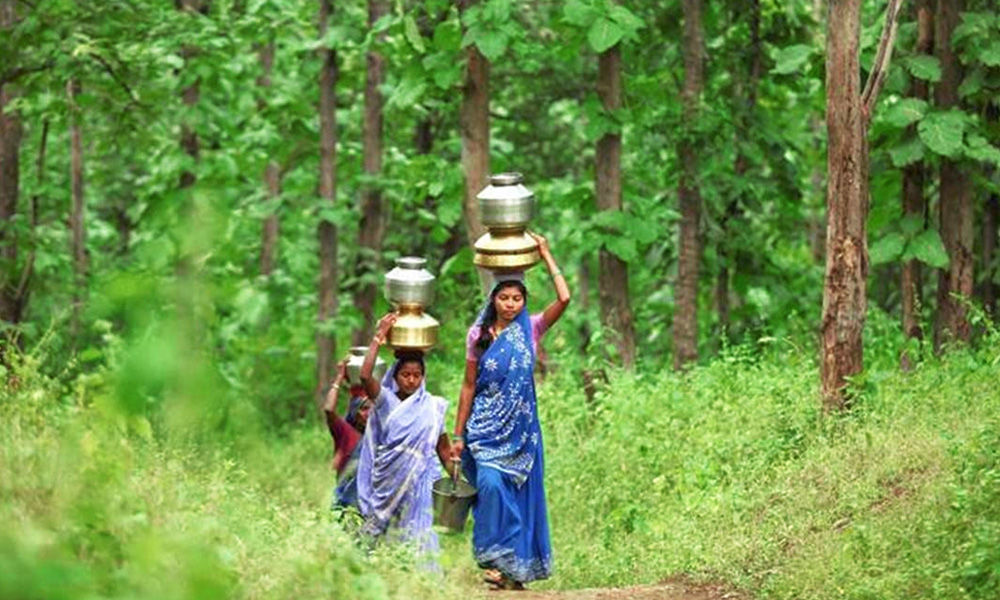A study by an international group of experts has found that around 300 million people across the world lived on land which has a high potential for forest restoration. The study also pointed out the importance of empowering local communities for the restoration of tropical forests as a just and sustainable mechanism for climate change mitigation.
The study – ‘Global forest restoration and the importance of prioritising local communities’ – has been written by experts based at the Indian School of Business, Hyderabad, Dartmouth College and the University of Michigan, USA, University of Manchester and the University of Sheffield from the UK and was published on August 25 in the Nature Ecology and Evolution journal.
The experts found that while currently, 294.4 million people live in areas with high potential for forest restoration in the tropics, over one billion people or roughly a seventh of the world’s population lived within eight kilometres of such high-potential sites.
The study is one of the first comprehensive studies to analyse the extent to which tropical forest restoration opportunities overlap with populations across the globe and levels of economic development.
Further, nearly 12 per cent of the population in low-income countries lives in crucial forest-restoration areas, highlighting the potential for improving the livelihood and well-being of millions of people, the study found.
The study pointed out that the success and viability of restoration projects can only be ensured through community participation.
‘We argue that the success of global forest restoration critically depends on prioritizing local communities. Empowering local communities to restore forests can provide human well-being benefits to millions of the most deprived and marginalized people, as well as environmental benefits for all,’ said study lead author James Erbaugh of Dartmouth College, who earned a doctorate from the University of Michigan School for Environment and Sustainability.
Managing of forest areas by communities includes the rights to access the forests, withdraw forest resources, and manage lands for community benefit.
Dr Ashwini Chhatre, a co-author and Professor of Public Policy at the Indian School of Business, told The Indian Express that the study ‘show the path to further action on climate change by identifying countries where investments in forest landscape restoration will create the highest synergies between mitigation and human development.’
‘Global efforts to accelerate forest regeneration must include local communities as equal partners for maximum benefits on multiple dimensions,’ he added.
For the study, the researchers analysed 22 countries, including India, with strong legal frameworks for community ownership of forested lands. The study found that these countries were home to two-thirds of the total number of forest restoration opportunity sites and 70 per cent of the people living in or near such areas.
The study further added that Brazil, the Democratic Republic of the Congo, India and Indonesia have the greatest number of people living in or near forest restoration opportunity areas. The findings pointed out that these areas have the greatest potential to remove heat-trapping carbon dioxide from the atmosphere and sequester it in forests.
‘There are many opportunities in central, eastern and southern Africa to restore forests and provide socioeconomic and infrastructure benefits to local people facing many multidimensional deprivations,’ Arun Agrawal, co-author of the study and Professor of Sustainability at the University of Michigan said.
‘Forest landscape restoration that prioritizes local communities by affording them rights to manage and restore forests provides a promising option to align global agendas for climate mitigation, conservation, environmental justice and sustainable development,’ he added.
The forest restoration initiatives can also help the countries in achieving the target of restoring 350 million hectares of forests by 2030, set under the New York Declaration on Forests (NYDF) in 2014 by the United Nations Climate Summit.
The NYDF had over 200 endorsers, including national governments, multi-national corporations, groups representing indigenous communities and non-profits and was a voluntary and non-binding international declaration to take action to halt global deforestation.
Meanwhile, the study pointed out the opportunity for forest restoration in India, which already has a robust legal framework for empowering local communities living in or near forest areas under the Forest Rights Act (FRA), 2006.
The authors of the study said that several states such as Maharashtra and Gujarat have already implemented this by setting up successful pilots for community rights. Chhattisgarh, Jharkhand, and Odisha have also prioritised expansion of community rights as a mechanism for empowerment and poverty alleviation within the last two years.
However, the study pointed out that less than three per cent …












